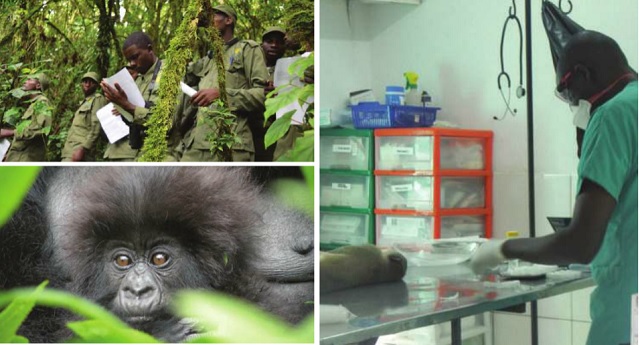
The OHAC has recently initiated a science tourism project under its OHAC/ Gorilla Health component. Here tourists, conservationists and others visitors a one-hour power-point presentation or a field visit focusing on OHAC work in conservation and especially the care of the famous mountain gorillas that reside in the Virunga Massif.
Science tourism is a travel component that groups scientific attractions. It covers interests in visiting and exploring not only scientific landmarks, museums, laboratories, observatories and universities, but also in site research and findings.
All OHAC projects are funded by well-wishers who have deep passion for the conservation of the environment, and Kinani is optimistic that he’s also going to engage with other international organisations to form a formidable partnership of promoting Rwanda’s conservation and tourism.
Kinani says working with wild animal is his childhood calling.
But it has been a long, winding journey for him to ultimately become part of a larger community who dedicate their time and passion in making sure that the wild animals also enjoy the bounty of what life has to provide through ensuring their health to survive.
As a young boy, Kinani’s says his source of thrill was visiting zoos spread around Lubumbashi in DR Congo where he grew up. He had a natural affinity to learn about the wild animals even when he was still a young, school going lad.
But his passion for the wildlife was planted at this time by none other than his father who told him one day that “you should strive to become a vet.” That’s why, when he completed his high school, he joined a veterinary school at the University of Lubumbashi.
However, he says that his dream of becoming a vet doctor was almost destroyed when he had to drop out of the university following the atrocious war that broke out in the early 90s in the DRC, formerly Zaire and then-president Mobutu Sese Seko was kicked-out.
Things did not get better for Kinani following the aftermath of the war. He says there soon developed an unhealthy and extreme xenophobia among the Congolese against people of Rwanda origin. Kinani moved to Senegal where he completed his bachelor degree in veterinary medicine in 2013 at Cheikh Anta Diop University.
After spending many years abroad, Kinani says he felt an itch to venture back to his homeland Rwanda. After the country was liberated from the genocidal regime, it became and overwhelming and irrepressible urge. His family had already relocated to Rwanda from DRC when he eventually also joined them. He was immediately invited to work with the Ministry of Agriculture’s artificial insemination center but he turned down the offer.
“My dream all along had been to work with wild animals, particularly the mountain gorillas,” he says.
In 2004, Kinani landed his dream job at the Mountain Gorilla Veterinary Project, an organisation of vets which monitors the health of mountain gorillas in Rwanda’s Volcanoes National Parks.
“When I first arrived at the Volcanoes National Park, I got the shock of my life since the mountain gorillas in the Virunga massif were on the verge of extinction. Their number was standing at a dismal 380 and all the time dwindling. There was something that needed to be done before they were completely wiped out from the earth,” he says.
His job was to make sure that the animals were not only protected from poachers but also to monitor their health.
In 2015, after 11 years saving mountain gorillas through daily veterinary care, Kinani left the Mountain Gorilla Veterinary Project and started OHAC. His mission, however, remains unchanged. He focuses on ensuring the health of all wild animals and that the country sees beyond the gorillas.
 The Independent Uganda: You get the Truth we Pay the Price
The Independent Uganda: You get the Truth we Pay the Price



